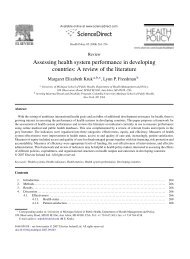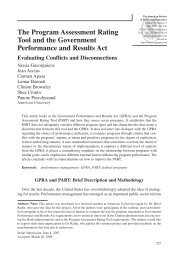Part II Community-Based Forest Management Program - ppmrn
Part II Community-Based Forest Management Program - ppmrn
Part II Community-Based Forest Management Program - ppmrn
Create successful ePaper yourself
Turn your PDF publications into a flip-book with our unique Google optimized e-Paper software.
EFFECTIVE COMMUNITY ORGANIZING<br />
livelihood projects which are mostly operational at the time of inspection. It<br />
was, however, noted that the apparent concentration on livelihood projects<br />
adversely affected the maintenance and protection of the established<br />
plantation with survival rate as of inspection date of only 62%.<br />
On the other hand, in three (3) other projects, the CO activities may not be<br />
considered satisfactory. This condition affected the POs capability to<br />
manage the sub-project as discussed below:<br />
• Not all required activities to be undertaken under MC 97-01 were actually<br />
undertaken. This is best illustrated in the case of DWSP where only nine (9)<br />
out of the twenty (20) identified training needs were conducted by ENATI.<br />
The trainings have minimal participants who were mostly PO officers. It was<br />
noted that only about thirty (30), out of the nine hundred sixty-five (965)<br />
reported beneficiaries participated in these seminars. The identified training<br />
needs not undertaken follow:<br />
Topics<br />
Farm Appraisal and Planning<br />
for Soil and Water<br />
Conservation Strategies<br />
Alley Farming with Livestock<br />
Raising<br />
Giant Bamboo and Propagule<br />
Production (with feasibility<br />
studies )<br />
Training on Upland Crop<br />
Production Technology<br />
Training on Women in<br />
Environment and Development<br />
Trainors’ Training<br />
Remarks/Possible Effect<br />
The PO was not oriented on various soil and<br />
water conservation strategies. The team<br />
observed that Kaingin system is still rampant in<br />
the area and the Model Farm envisioned in its<br />
2003 AWP has yet to be established.<br />
PO members verbalized during interviews that<br />
they still need trainings that could help them<br />
establish other livelihood projects.<br />
These trainings could have guided the POs in<br />
establishing other livelihood projects and in<br />
improving upland farming techniques.<br />
This training could improve and strengthen<br />
social interactions among DMADAI and<br />
community members.<br />
This training could have enhanced the skills of<br />
the DMADAI officers in conducting meetings,<br />
trainings and symposiums. As gathered in the<br />
interviews, PO affairs/activities were mostly<br />
attended by PO officers only.<br />
• Some activities undertaken did not produce satisfactory results due to short<br />
period of training and inadequate feasibility studies. This resulted in the<br />
suspension and termination of a number of livelihood projects and individual<br />
operation of others due to unsuitable climate, absence of market, high costs<br />
of farm inputs and unavailability of raw materials as exemplified in the<br />
following livelihood projects established in DWSP, PWRS and STAGBAK<br />
MRSP.<br />
39





